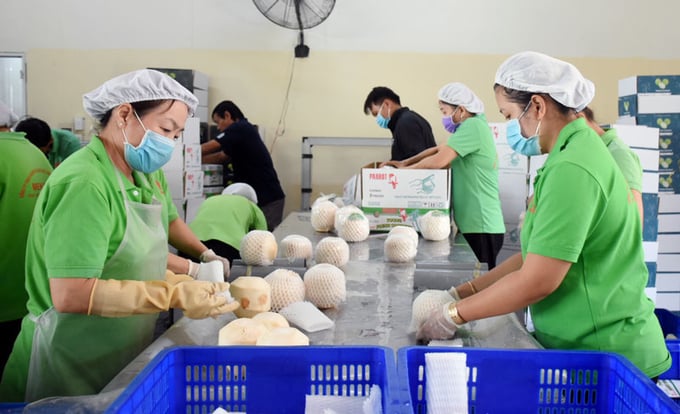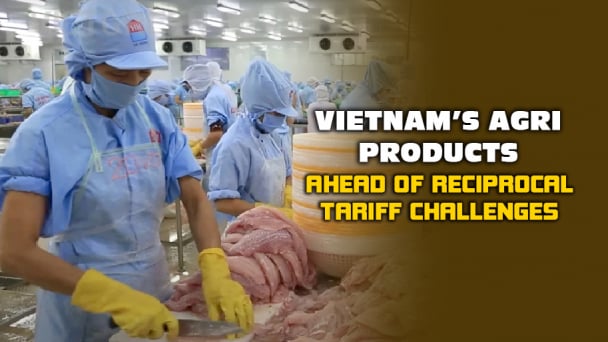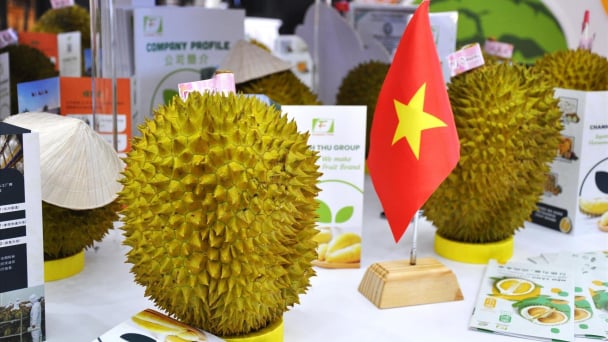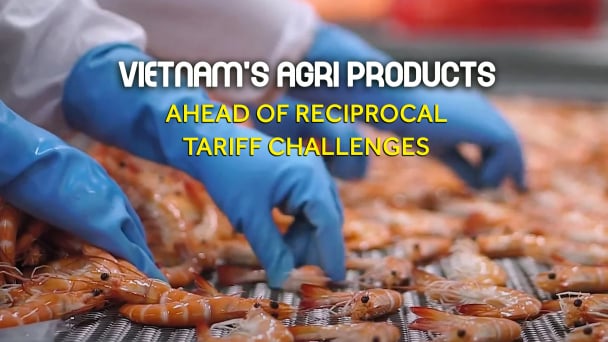May 31, 2025 | 06:44 GMT +7
May 31, 2025 | 06:44 GMT +7
Hotline: 0913.378.918
May 31, 2025 | 06:44 GMT +7
Hotline: 0913.378.918

In post-harvest handling, the US side requires fresh young coconuts to be stripped of all the green skin and at least 75% of the outer shell of the husk.
On August 8, APHIS wrote to Plant Protection Department for a communication providing the updated agenda and the latter’s delegation for the 2023 plant health bilateral meeting. As part of the upcoming discussions, APHIS expects that the two sides can reach a final agreement on the import requirements for California peaches and nectarines.
Besides, APHIS also announced an update regarding market access for coconuts with partial husk exported from Vietnam to the United States.
“APHIS understands this is an important topic for your producers, and we prioritized work on this request. While we were proceeding with next steps in the new market access process, we conducted another, internal analysis to evaluate this commodity”, the USDA’s Service shared.
As a result of APHIS’ pest risk assessment, which showed no quarantine pests follow the pathway, and the internal evaluation, APHIS determined fresh, partially dehusked coconuts meet our definition of a processed product, with negligible risk of spreading plant pests.
This means instead of having to go through the lengthy, new market access regulatory process for fresh fruits and vegetables, APHIS was instead able to use existing regulations for processed products to regulate shipments of coconuts with partial husk. This greatly expedited the timeline for APHIS approval of coconut imports from Vietnam.
On August 7, APHIS shared that it had completed updating the Agricultural Commodity Import Requirements (ACIR) online database to approve the import of immature, partially de-husked coconuts from Viet Nam with at least 75% (3/4) of the green, outer shell of the husk removed.
It is said that Vietnam producers can immediately begin shipping partially dehusked coconuts to the United States. Because APHIS has classified partially dehusked coconuts as a processed product, the only phytosanitary requirement is that shipments will be subject to inspection at U.S. ports of entry. The unit has already communicated this update to U.S. Customs and Border Protection officials to avoid any shipment delays at U.S. ports of entry.
Previously, in April 2023, during a meeting with US Secretary of Agriculture Thomas Vilsack, Minister of Agriculture and Rural Development Le Minh Hoan announced that the procedures had been concluded and the market for pomelos from the United States to Vietnam had been opened. In addition, it is proposed that the United States expedite the assessment process and open the door to coconut and passion fruit from Vietnam.
The United States sent the results of an insect risk analysis for fresh Vietnamese coconuts in February 2023. Consequently, 43 species of parasites on coconut trees were identified, but none of them were able to travel with immature, fresh coconuts exported from Vietnam to the United States.
The United States has mandated that Vietnam treat freshly harvested juvenile coconuts by removing rotten, fallen fruits, all green epidermis, and at least 75% of the husk.
The Plant Protection Department has contacted and coordinated closely with the US Department of Animal and Plant Quarantine to select phytosanitary measures to reduce the risk of pest infestation. Simultaneously, in February 2023, the Department sent an official dispatch to the Departments of Agriculture and Rural Development of the provinces and cities where coconuts are grown, as well as to associated production, processing, and exporting businesses.
Vietnam's fresh coconut industry is a "billion-dollar" business. The country will be the fourth greatest exporter of coconut products in the Asia-Pacific region in 2022, with an estimated export turnover of approximately USD 900 million USD.
Currently, Vietnam has approximately 200,000 hectares of agricultural land for coconut cultivation, with an output of approximately 2 million tons, primarily in the provinces of Tra Vinh and Ben Tre in the Mekong Delta and the Central Coast.
Vietnam, one of the top 10 coconut-producing nations in the globe, is actively expanding the market for this product. The Ministry of Agriculture and Rural Development has actively directed relevant entities to export official coconut products to China, in addition to the United States.
The International Coconut Community forecast the global industry to annually grow at 10% until 2025 with some individual products such as coconut cream, juice, oil, and jelly growing by 15-36%.
Translated by Linh Linh

(VAN) Reciprocal tariffs are exerting pressure on U.S. exports, prompting Vietnamese firms to shift their focus to Muslim markets, Thailand, and Brazil.

(VAN) A free booth for two years at Xinfadi, Beijing's largest wholesale market, will be allocated to Vietnam's agricultural products.

(VAN) Vietnamese shrimp exporters are actively looking for alternative markets and accelerating shipments to the United States in response to the pressure of impending reciprocal tariffs. This is occurring during a temporary tariff suspension.

(VAN) The import-export turnover between Vietnam and Singapore rose amid a trade rebound, with machinery, electrical equipment, and fuels making up the majority of the transaction value.

(VAN) Director General of the General Administration of Customs of China, Ms. Sun Mai Jun, has pledged to implement measures that will ease the import process for Vietnamese agricultural products.

(VAN) Although Vietnam is still increasing its coffee exports, the industry is currently in the process of determining market strategies in response to the U.S. imposition of reciprocal tariffs.

(VAN) With rising demand in Muslim-majority countries, Halal certification is becoming a critical passport for Vietnamese agricultural products seeking sustainable market access and consumer trust in the Middle East and Africa.